The public hearings in the International Court of Justice about Israel’s practices and policies in the occupied Palestinian territories continued their third day.
52 states had requested to make additional oral statements in the case, that started with a UN General Assembly resolution on December 30, 2022. The Assembly asked the court for a non-binding advisory opinion.
On Wednesday, the following countries presented their opinion: Colombia, Cuba, Egypt, United Arab Emirates, United States of America, the Russian Federation, France, Gambia, Guyana and Hungary.
The countries expressed varying opinions. The majority of the speakers demanded from the court a clear condemnation of Israel’s illegal occupation, with Cuba pronouncing the U.S. complicity and Guyana criticizing U.S. position explicitly. The United States meanwhile called the court to restrict itself in its opinion, while Hungary even requested it should outright decline to provide an opinion.
The hearings will continue until Monday, February 26. Below are the statements delivered today in the International Court of Justice.
Colombia: Israel obliged to cease action
On behalf of Colombia spoke Andrea Jiménez Herrera, Minister Counsellor, Head of the Group of Affairs before the International Court of Justice at the Ministry of Foreign Affairs
Colombia rejects any kind of violence and holds states responsible for their actions. Occupation is a violation of international law, Herrera stated.
According to the Colombian representative, “both, Israel and Palestine” have an obligation to abide by the law, both must implement UNSC resolutions. The goal is a “negotiated solution with a fully viable Palestinian state side by side with Israel”.
Contrary to the argument of few states, the court does have jurisdiction over the issue as it is demanded by a relevant organ, the UN General assembly, and treats a legal question. The court already has dismissed such objections in its 2004 ruling regarding the wall in Palestine.
She continued that the situation in Palestine had “changed dramatically” since the request was filed. On October 7, Israel was victim of a “horrendous attack by Hamas”, stated Herrera.
She reminded that the court in its recent ruling in the case demanded by South Africa the “dire situation of the Palestinian people in Gaza”. Israel’s military action has “taken things to worse”. Gaza has become “more deadly”, thus “legal consequences are more serious”.
This case demanded by the General Assembly “has a wider scope” than the case opened by South Africa, as it covers all Palestinian territories and deals with all Israeli actions also beyond genocide, explained Herrera.
Colombia “calls on the court to pave way for peaceful solution” and “views occupation that includes annexation as illegal acquisition of territory”, said the Minister Counsellor. Israel’s occupation “has been acquisitive since onset”. They are breaches of various international agreements, she added.
Israel is obliged to cease action, end occupation unconditionally and immediately, must deliver guarantees of non-repetition” and pay reparation for the caused damage.
“All states are under obligation not to recognize illegal annexation” UN General Assembly and Security Council “must consider” what is necessary to bring illegal occupation to an end. “At stake is the safety and the very existence of the Palestinian people”. The UN has a “permanent responsibility” towards Palestine, concluded the Colombian representative.
Cuba: Israel commits “low intensity genocide”, the United States is complicit
On behalf of Cuba spoke Anayansi Rodríguez Camejo, Deputy Minister for Foreign Affairs
Cuba has already presented a written statement, the presence in the hearing occurs in the interest of preserving the existence of the Palestinian people, the Deputy Minister stated. The Palestinian people continues to be massacred with “the complicity of countries such as the United States, responsible before the international law for genocide, war crimes, crimes against humanity and the apartheid regime”.
According to Rodríguez Camejo, the court and the delegations “bear a high moral, historical and legal responsibility to pronounce ourselves in a clear, transparent and forceful manner on the ignominious situation of the Palestinian people”.
Israel’s occupation “is a wrongful act” that violates general customary law. The UN resolution 242 from 1967 demands Israel to withdraw from the occupied territories and establishes the Green Line as the demarcation line between Israel and Palestine. Thus, occupation turns into an illegal act of annexation”, she added.
Israel’s occupation of East Jerusalem and the Golan Heights are null and void and should not be recognized.
According to the Cuban representative, Israel also violates the UN Declaration of the Granting of Independence to Colonial Countries and Peoples, which establishes the Palestinian right to self-determination. In contradiction to that, Israel pursues a settlement policy with the aim of “forced demographic change”. By that, Israel violates the UNSC resolution 242 and the Oslo Accords which demand that no party shall modify the situation until pending negotiated solution.
Israel also commits war crimes under the Fourth Geneva Convention and international humanitarian law by its “destruction and appropriation of property”, its “collective punishment” by the blockade of the Gaza Strip, lack of protection of civilians.
“All this with the complicity of the United States of America which prevents the international community from acting to protect the Palestinian people. The justification for fighting terrorists and exercising the right to self-defense are deceitful when they are raised by the aggressors themselves”, Rodríguez Camejo said.
Israel pursues “institutionalized violence” that includes “massive confiscations of land and property, unlawful killings, extrajudicial executions, torture, administrative detentions, forced transfers, restriction of movement and the denial of nationality and citizenship to the Palestinian population”.
This all amounts to “low-intensity genocide”, for which to be stated one single case of a victim is enough.
The court should “establish responsibilities for Israel and its accomplices” in regard to state responsibility, oblige all states to comply with existing norms, address separately the issue of responsibility of other states when aiding Israel and make a “special pronouncement” in regard to Jerusalem.
“The international community requires a pronouncement that makes it clear to those responsible that today they may use their force against the innocent civilians, but this force will not be enough to spare them from justice.”
Egypt: “History will judge on us for how we respond today”
Jasmine Moussa, Legal Counsellor, Cabinet of the Minister for Foreign Affairs, Ministry of Foreign Affairs spoke on behalf of the Arab Republic of Egypt.
“Israel is deliberately creating conditions in Gaza that make life in Gaza impossible”, she began her words. The presumed attack on the city of Rafah is a continuation of the policy of mass expulsion. Israel also continues its illegal acts in the West Bank, burying any hope for the two-state-solution.
Palestine is “de facto and de jure under annexation” with a “blatant disregard for international law. The numbers of illegal settlers have arrived at 750 thousand, meaning a “deliberate alteration” of demographic structure.
Moussa said Israel’s prolonged occupation is a violation of the law of occupation the preemptory prohibition of the acquisition of land by force and the fundamental prohibition of racial discrimination. It aims to “permanently alter demographic situation and annex” the territories.
This amounts to “ethnic cleansing”, she stated, resembling practices of “colonization used during World War II” and violates the Geneva Convention. The Israeli military rule is “systemic de-Palestinazation” of territory. Occupation is inconsistent with self-determination and violates basic points of the UN Charter.
While the West Bank and Gaza “constitute one single territorial unit”, Israel applies “medieval methods” such as blockade and siege. Its military orders “entrench” racial discrimination. It is under obligation to “repeal all legislation” of racial discrimination.
“History will judge on us for how we respond today”, the Egyptian representative concluded.
United Arab Emirates: Veto is incompatible with obligation to international law
For the United Arab Emirates spoke Lana Nusseibeh, Assistant Minister for Political Affairs, Permanent Representative to the United Nations.
The UAE participates “in advisory proceedings for the first time in its history in a critical time of growing polarization over when and how international law is applied”, she began her words.
“The only path to just and lasting peace is through the fulfillment of the long-denied right of the Palestinian people to self-determination with an independent and sovereign Palestine based on the 1967 borders, with East Jerusalem as its capital, living side by side with Israel”, Nusseibeh said.
Since December 2022, Israel’s violations and the level of violence has “risen sharply” she added. “We convene today while Israel’s grave violations against Palestinians persist with impunity, four months into its military operation in Gaza and following four failures by the Security Council to call for a ceasefire.”
“The Court will be advising on legal questions directly relevant to the two-state solution” and will thus “aide efforts to realize the right of the Palestinian people to self-determination.
Israel continues to “change facts on the ground”: Gaza’s population of 2.2. is under severe restrictions on water, food and other essential goods, the suffering is on “a scale seldom seen in modern era”.
Its offensive violates various articles of the Fourth Geneva Convention: Imposed collective punishment violates article 33, forced re-evacuation article 49, lack of ensuring food and medical supplies article 55 and the failure to protect the wounded article 16 of the convention.
“Israel’s occupation is illegal and must end”, demanded the representative from the Emirates. It cannot “remain without consequence”. It must dismantle settlements and prevent violence by settlers.
The UAE believes that diplomatic engagement and dialogue can be effective tools to encourage compliance and cessation of unlawful conduct. But where these tools fail, third states’ obligations remain.”
“Voting against or preventing the adoption of a Security Council resolution that seeks to put an end to serious breaches of international law cannot be compatible with such obligations.”
“Peace will remain elusive while the Palestinian people’s inalienable right to self-determination continues to be denied”, concluded Nusseibeh her presentation.
U.S.: Court should limit itself and not oblige Israel to immediate withdrawal
Richard C. Visek, Acting Legal Adviser, Department of State, spoke representing the United States of America.
“The court has a serious and difficult task before it”, began Visek his words. “The United States is engaging to not only to address the current crisis, but to get beyond where we have been, namely, to advance a political settlement that will lead to a durable peace in the region that includes lasting security for Israelis and Palestinians and a path to Palestinian statehood.”
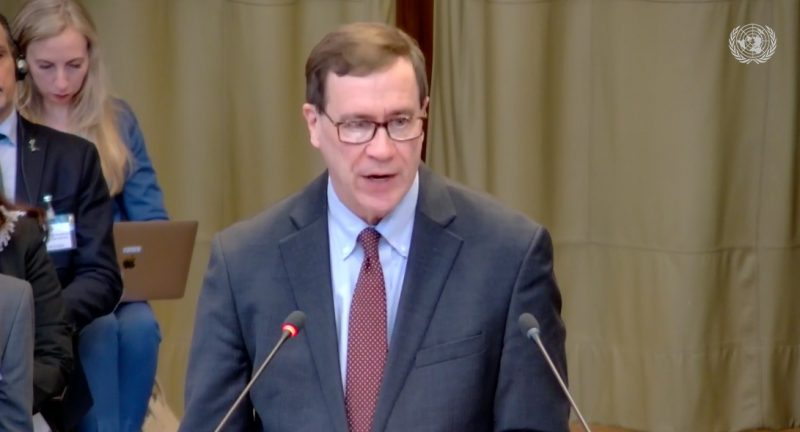
UN resolutions 242 and 338 are “the core of the established framework”, he stated, while “there is a broad international support for achieving a negotiated solution.” He continued: “United States encourages the Court to ensure that its opinion preserves and promotes the established framework.”
“Security Council Resolutions 242 and 338 and subsequent resolutions call for the application of two interdependent and inseparable requirements for a just and lasting peace. One is the withdrawal of forces from occupied territory, and the other is peace and security for states in the Middle East through acknowledgement of the sovereignty, territorial integrity, and political independence of every state in the area”.
According to the US representative, “This principle is referred to by both the Security Council and the General Assembly as land for peace”.
These interdependent and inseparable requirements have been the “organizing principle of historic peace agreements, first between Israel and Egypt, and then between Israel and Jordan” and the Oslo Accords, though the “promise of Oslo has yet to be fulfilled”, he stated.
“The Court has appropriately recognized that its role in rendering an advisory opinion is to assist the requesting UN organ while taking care to avoid a result that could undermine the determinations of the Security Council and its primary responsibility for the maintenance of international peace and security.”
Therefore, “the Court should not take up the suggestion of some to interpret the questions in this proceeding as encompassing the entire question of Palestine.”
“The challenge for the court is how to provide its advice in a way that promotes the framework rather than disrupting its balance, potentially making the possibility of negotiations even more difficult.”
“It would not be conducive to achievement of the established framework to issue an opinion that calls for a unilateral, immediate, and unconditional withdrawal by Israel that does not account for Israel’s legitimate security needs. Such an outcome would be contrary to the established framework which the Security Council and General Assembly have structured around the two interdependent and inseparable elements, not only withdrawal, but also the conditions necessary for peace and security for all states in the region.”
Visek continued: “It is important that the Court keep in mind the balance that the Security Council and General Assembly have determined is necessary to provide the best chance for durable peace.”
“International law does not provide for an occupation itself to be rendered unlawful or void, based either on its duration or on any violations of occupation.”
“The Fourth Geneva Convention prohibits an occupying power from transferring parts of its own civilian population into territory it occupies. Even if an occupying power violates such a prohibition, the legal status of the occupation would not change as a consequence, because the occupation continues in fact.”
On occupation, the US representative commented: “With respect to duration, international law does not impose specific time limits on an occupation. That said, belligerent occupation is a temporary measure for administering territory under the control of belligerent armed forces.”
“The Court should not find that Israel is legally obligated to immediately and unconditionally withdraw from occupied territory.”
Visek concluded by saying: “The Security Council and General Assembly continue to make clear their support for the two-state solution and the established framework to fulfill it. This conflict cannot be resolved through violence or unilateral actions. Negotiations are the path to lasting peace. For these reasons, we respectfully encourage the Court to carefully calibrate its advice in this proceeding to support and promote final realization of peace and stability within the established UN framework set out in Security Council Resolutions 242 and 338.”
Russia: The court’s opinion should “contribute to peace process”
On behalf of the Russian Federation spoke Vladimir Tarabrin, the country’s Ambassador to the Kingdom of the Netherlands.
Tarabrin began with a balanced approach. He described the situation in Gaza as a “genuine humanitarian catastrophe”, providing details of destruction caused by “systematic violation of human rights” by Israel. He then added “Russia of all countries understands the dangers of terrorism” and offered condolences to the “Israelis who lost their loved ones in the attack on the 7th of October”.
After expressing that Russia “highly values stable relations” with Israel, the Russian ambassador stated, “the tragic events of the 7th of October cannot justify the collective punishment of more than 2 million Gazans.”
“Outbreaks of violence will inevitably occur again until the Palestinian people exercises its right to establish an independent state”, said Tarabrin and openly blamed the United States for the given situation.
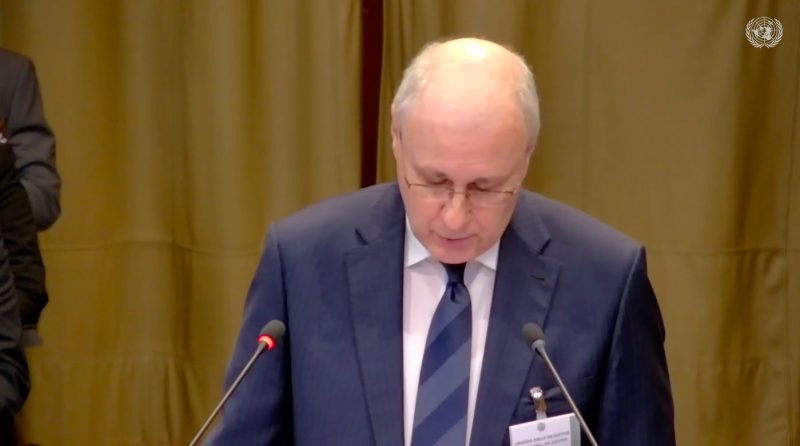
The situation “was preceded by a persistent policy of the United States and its allies aimed at freezing the status quo, watering down the political processes, promoting a one-sided vision of a settlement. Among the victims of such short-sighted and irresponsible approach was the quartet of mediators whose work has been effectively blocked by the United States. This flawed policy of Washington has predictably led to a failure that has cost thousands of innocent lives”, said the ambassador.
He then draws a perspective, saying that “After the violent phase has been overcome, the parties will need help in establishing a full-fledged political dialogue”, to which the “advisory opinion will contribute”, hoped the Russian representative.
Tarabrin clearly stated that “occupation must come to an end” and criticized settlement activities as “continuous violations of human rights, leading to a progressive shrinking of Palestinian lands”. “Israel’s duty is to comply with the obligations it has breached”, concluded the ambassador.
But in regard to the court opinion, his central argument was a different one:
“Discussion on Israel’s responsibility must remain within the limits imposed by the advisory nature of these proceedings and to the need to create conditions for successful final status negotiations. Israel and Palestine are under an obligation to conduct in good faith and without delay negotiations aimed at reaching a final status agreement.”
According to Tarabrin, the court should provide an opinion without “engaging in a detailed discussion on the precise scope and forms of implementation of Israel’s responsibility” and instead focus on an opinion “useful for the General Assembly”.
The court “should be guided by the principles of the peace process” , at whose center Tarabrin places Israeli-Palestinian negotiations, “and should actively seek to give an opinion that would contribute to their implementation.”
France: Jerusalem as the capital of both, Israel and Palestine
The speaker for France, Diégo Colas, Legal Adviser, Director of Legal Affairs at the Ministry for Europe and Foreign Affairs, agreed with the Russian representative and called for a “decisive and credible restarting of peace process”.
But Colas started his presentation with an emphasis on the “terrorist attack of unprecedented scale” on October 7, express his solidarity with Israel and stated “Israel has the right to defend itself”. On the other side, added the French representative, has this to happen “in compliance with international humanitarian law” and remarked that Israeli bombing had “created thousands of civilian victims in Gaza”.
The status of Jerusalem is an issue in almost all presentation, and for Colas, it is the capital of both, Israel and Palestine. “Continuing occupation but also the development of settlements and the fragmentation resulting from these settlements undermine the creation of a viable state of Palestine”, said the French representative. He added that France had taken measures on a national basis “against certain violent Israeli settlers”.
“France reiterates its condemnation of pronouncements promoting the installation of settlements in Gaza and the transfer of the Palestinian population of Gaza outside this territory”, said the French representative.
“Any solution for peace will necessarily first require security arrangements be concluded between Israelis and Palestinians, providing concrete and efficient guarantees”, said the French lawyer and demanded that the court, “while shedding light on the legal questions posed, goes no further than is necessary to do so”.
The Gambia: Occupation “illegal from the onset”
On behalf of Gambia spoke Dawda A. Jallow, Attorney General and Minister of Justice of the country.
Jallow stated that “no goal can be achieved for the Palestinian people until the occupation ends”. He reminded that the international community had found occupation “illegal already over the past years”.
The Gambian representative explained it was illegal as it hindered the self-determination of the Palestinian people, established an apartheid regime and violated rules regarding the use of force.
“Israel launched the 1967 war and tripled its territory”, Jallow said, “and this wasn’t a response, thus illegal from the onset.”
“If we are ever to achieve UN goals regarding Palestine, this court must act and recognize that Israel’s occupation is illegal”, the Minister from Gambia declared.
Guyana: Against “military conquest” an “authoritative exposition on international law” needed
On behalf of Guyana spoke the lawyer Edward Craven as counsel and advocate. Crawen first criticized the notion that an opinion by the court would hinder or affect ongoing negotiations, as some, including the United States, had declared in their statements.
“Such negotations do not exist”, stated Craven, adding any possible negotiations “must be grounded in international law” and ensuring its compliance.
Craven explicitly criticized the U.S. position: “The United States contends that an occupation cannot be unlawful or lawful. For the United States, when it comes to occupation, international humanitarian law is both the start and the end. Guyana disagrees. The conduct of an occupation is governed by international humanitarian law, while the legality of an occupation as a whole is determined by the United Nations Charter and general international law”.
The Guyana representative then continued “permanent occupation is not occupation at all. It is military conquest”.
“For many, many years, Israel has chosen to place its own expansionist interests above the duty to respect international law”, said Craven and concluded: “An authoritative exposition of international law, including a determination by the court that the occupation is illegal as a whole and must be brought to an immediate end, will serve the ends of justice, will vindicate the rule of international law, and will provide the basis for a just, comprehensive and lasting peace”.
Hungary: Court should decline to give opinion
The final oral statement was made by Hungary. Attila Hidegh, Deputy State Secretary for International Cooperation, Ministry of Foreign Affairs and Trade of Hungary, and Gergő Kocsis, Head of the United Nations Department spoke on behalf of the country.
The Hungarian delegation presented an entirely different approach than the majority of the participating states.
Speaking first, Hidegh draw “a broader political context”. Stating that a solution could only be found in direct negotiations between the parties, the ascendance of Hamas to power in 2007 “shifted the political context” according to him, “inducing intra-Palestinian divisions”.
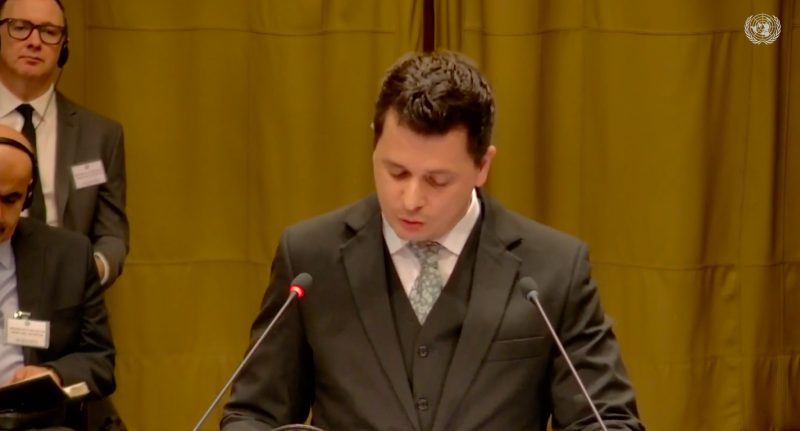
“The Abraham Accords established in 2020 provided a novel approach”, said the Hungarian representative, “that has allowed for the normalization of relations between Israel and a number of Arab countries, creating a more conductive environment for the negotiated solution of the conflict”.
Hidegh called Hamas’ attack of October 7 “one of the worst terrorist attacks and sexual barbarism the world has seen in 100 years and an attack not only on a democratic country, but an assault on all democracies around the world.”
Since then, “Israel has been fighting the terrorist organization Hamas with the aim of eradicate terrorist”, while civilians were “used as shields”.
“The proceedings brought before the court may directly contribute to the escalation of the conflict”, argued the Hungarian Deputy Secretary for International Cooperation, and his colleague, Kocsis explained why the court should decline to give the advisory opinion that the UN General Assembly had demanded.
Though acknowledging the court had jurisdiction, it should “reject to exercise it” because the matter of debate is “essentially of bilateral nature”, said Kocsis.
He expressed “sincere doubt” that the question, legal consequences of the occupation of Palestinian territories, “would allow for an appropriate opinion”. “These proceedings are not an appropriate forum for making the kinds of determinations implied in the question”, said the Hungarian representative, adding that such an opinion would lead to “unduly politization of the esteemed institution of an otherwise strictly judicial character”.
He feared such an opinion could “become part of an already heated political debate”.
In conclusion, the Hungarian delegate, who saw the chance for viable state of Palestine only in direct negotiations between the parties, requested the court to decline providing an advisory opinion.


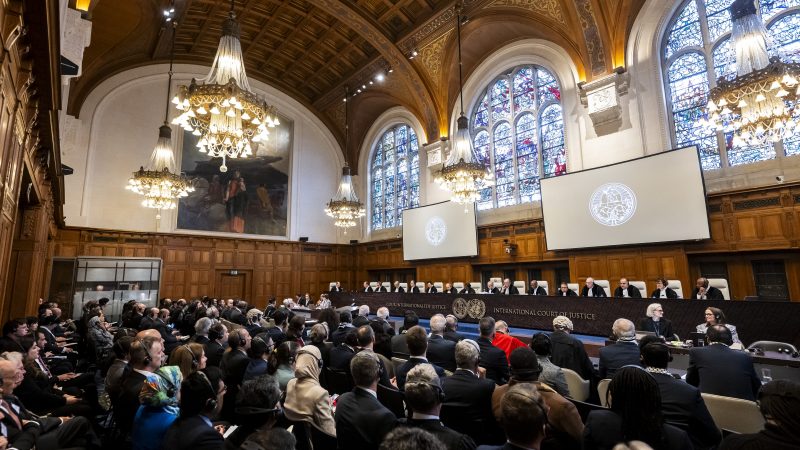

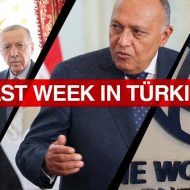




Leave a Reply